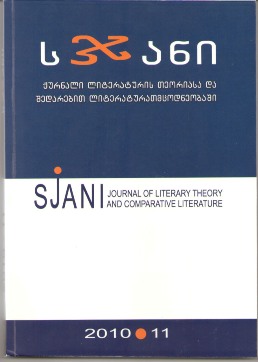ბედისწერის სათამაშოები (ჯავახიშვილისა და კამიუს მოთხრობების მიხედვით)
Toys of Fate (according to the fiction of Javakhishvili and Camus)
Author(s): Maia JaliashviliSubject(s): Literary Texts
Published by: ლიტერატურის ინსტიტუტის გამომცემლობა
Keywords: fate; Javakhishvili; Camus; interpretation.
Summary/Abstract: Fate represents one of the most ancient themes of world literature. Since ancient times, writers have been seeking the essence of this phenomenon. Mikheil Javakhishvili depicted complex interdependence of fate and a man in his novels. In the special letter dedicated to Henrik Ibsen, Javakhishvili discusses this issue. He recalled the classic age of Greek literature, when man considered that every phenomenon of nature was determined by destiny, which was unknown, unseen and they were convinced that fate gives people destiny or glory, wealth or poverty, happiness or death. In Javakhishvili’s opinion, the content of Greek tragedy was based on total human struggle with destiny. The writer thinks that the theme of fate has gradually changed in literature. The real ground of Shakespeare’s destiny is the human desire and aspiration, that is like Christian conscience. At present we represent the theme of destiny according to the two stories of Mikheil Javakhishvili “Two Sons” and Camus “A Misunderstanding”. Camus wrote this work, as he said, “Gloomy Play~, in 1943 in occupied France. The writer was trying to show the oldest topic of destiny within modern framework. “Two Sons“ by Mikheil Javakhishvili was written in 1928 in Georgia, as well as the occupied country. The certain similarities made us compare these two texts with each other. Main similarity with the works of Javakhishvili and Camus is the development of the same theme and the following issues: 1. People could not escape Fate 2. Fate plays with people as toys. 3. Sin did not disappear without leaving a trace. 4. The man commits a sin and at the same time asks forgiveness of God, crosses himself and at the same time kills people. Parents kill their son in both works. It is noteworthy that neither Zakro (“Two Sons“) nor mother (“A Misunderstanding“) know that they have kill their children. They are sure that strangers are killed and they did not worry about committed murder and did not feel the burden of a horrible sin. They are not tormented by the lack of conscience or pain, but as soon as they realize that they have killed their own sons, they are horrified. Zakro (“Two Sons“) turns mad and mother (“A Misunderstanding“) commits a suicide. In both works the killers have accomplices. Zakro’s wife Nato supports him, and the daughter _ her mother. The personages in both works are trying to gain their happiness at the expense of others’ misfortunes. Zakro is worried about the future of his little boy. That‘s why people are killing and looting. In addition, mother and daughter Martha dream of other life. In both texts children had disappeared and later have returned. They did not immediately manifest themselves. They wish to make unexpected glad to their parents, but merciless destiny laughs on them and they are killed by the hands of their parents. Mikheil Javakhishvili and Albert Camus read life as a text and offered their own interesting artistic interpretation of the mistery of life.
Journal: სჯანი
- Issue Year: 2010
- Issue No: 11
- Page Range: 105-109
- Page Count: 5
- Language: Georgian

